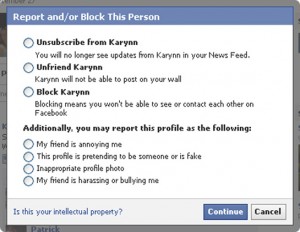
Reporting Abuse on a Facebook Individual User.” State of California – Department of Justice – Kamala D. Harris Attorney General. Department of Justice, 2015. Web. 8 Apr. 2016.
King, Melissa. “Better Online Living Through Content Moderation,” Model View Culture 28 (October 14, 2015). Web: https://modelviewculture.com/pieces/better-online-living-through-content-moderation.
In the article, ”Better Online Living Through Content Moderation,” written by Melissa King, she discusses the uses of content/ trigger warnings, block and ignore functions, block lists and privacy options that help to improve one’s computer experience by dismissing content they don’t want to see. She goes on to explain in further detail as to what kind of people benefit from these content managers, such as those with limited patience, anyone who wants to improve their online experience, and those who suffer from PTSD, who avoid triggers or topics that could cause anxiety.
King speaks about how those who prefer to use content moderates are highly criticized as being too “sensitive” or “weak,” which creates this stigma for people to expose themselves to various aspects they cannot handle or view as too much. Some of these things that can be considered too much are cyber-attacks, violence, and graphic content. In most cases these things arise from a disagreement or intentional provoking of violence or attacks.
Next in this article, she discusses the arguments posed against content control from the opposing forces. One major argument being that people tend to blow abuse and harassment out of proportion and therefore should remain less sensitive regarding coping. The opposing forces believe that for a society to be stronger, there must be an environment of free exposure without content moderation. To have gradual exposure to this particular content is likened to that of Exposure Theory, a term that King describes as being able to overcome these triggers and treat fears. In other words, the more you are exposed to an environment, the less you will be affected. This notion isn’t true when it comes to PTSD victims because overexposure will magnify their trauma rather than reduce it when faced with triggering content. Also, she mentions about how open the younger generations are too complex and emotional content and how they suffer from a bigger pushback against political and sensitivity correctness in the Western culture.
King then goes on to discuss how ignorance is depicted through media and myth about the truths of PTSD and how this disorder isn’t something that only veterans suffer from, but can also derive from cyber-attacks. She references a statement from a psychologist who specializes in anxiety disorders by the name of Caleb Lack, who spoke out about the truth of disorders and the effects cyber-bullying has on mental health. She then discusses the uses of block lists towards users and hate groups, how to opt into one that’s suitable for your need, and the most compelling arguments against them that come from those who haven’t done any threatening or harassing.
Finally, King concludes her article with the discussion of how ferocious online attacks can be and the dangers they prose can even go as far as harassing and calling family, and threatening to post personal information. Women are considered fair game when it comes to these type of attacks as stated by King and it is best that they utilize content and blocking tools to avoid digital abuse. Which is why having tools such as block lists and content modifiers are useful for those who desire and want to use them for the purpose of security to protect themselves and their mental health from the displeasing and anxiety-triggering trolling and cyber-bulling.